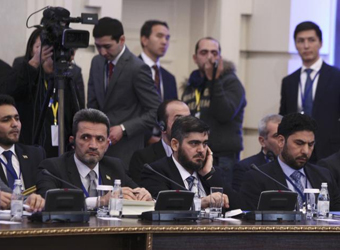The Syrian opposition will not attend peace talks due to start on Tuesday in the Kazakh capital Astana, blaming Russia’s unwillingness to end air strikes against civilians in rebel-held areas and its failure to put pressure on the Syrian army to abide by a widely violated ceasefire.
Osama Abu Zaid, a spokesman for the rebels said they had taken a final decision not to go to the talks as a result of Russia’s failure to end what the opposition says are widespread violations of a Turkish-Russian brokered ceasefire last December.
“Currently the decision is not to go as a result of Russia continuing its crimes in Syria against civilians and its support of the crimes of the Syrian regime,” he said, adding that they had informed Turkey, a main backer of the rebels, of their decision.
Colonel Ahmad Othman, who heads the Turkish-backed Sultan Murad rebel brigade, earlier said rebels were awaiting a Russian response to a letter that demands Moscow acts as a guarantor and ends violations of the ceasefire.
“Nothing has been implemented so far,” said Othman, complaining of Russian strikes on civilians and assaults by the Syrian army in rebel-held areas.
Syrian rebel groups on Saturday called for the postponement of the Russian-backed peace talks in Kazakhstan and said further meetings would depend on whether the Syrian government and its allies adhered to a newly declared March 7-20 ceasefire.
Russia backs Syrian President Bashar al-Assad in the conflict, and has launched a diplomatic peace initiative after its air force helped the Syrian government defeat rebels in Aleppo in December – Assad’s biggest victory of the war.
The rebels said the government and its Iranian-backed militia allies were continuing to bombard opposition-held areas near Damascus, Homs, Deraa and Idlib, and preparing to storm two districts on the outskirts of the Syrian capital.
“Moscow has not lived up to its commitments. The main demand is stopping the bombardment and displacement of people,” Othman added.
Rebels said an evacuation deal reached on Monday that forces rebel fighters to leave the opposition-held besieged Homs district of al-Waer dealt a blow to Russia’s attempts to portray itself as a credible guarantor of the ceasefire deal.
The evacuation deal was seen as a surrender forced upon rebels after relentless bombing by Syrian jets of the teeming neighborhood with Moscow’s seal of approval.
“It seems Russia invites us to Astana and then imposes forcible displacement of the people of al-Waer … Moscow has not kept its promises,” said Mohammad Alloush, the head of the armed factions’ delegations participating in the past two Astana rounds.
Alloush later confirmed they were not attending saying Moscow had not kept its promises to stop the bombing of civilian areas or ending displacement of people in rebel pockets near Damascus.
“We want to show the world that the Russians want a political solution that is only in the media. They have to change their policies if they are seeking a solution,” Alloush added.
Separately, Salem al Muslet, a spokesman for the High Negotiations Committee, the mainstream opposition body, said Russia’s unwillingness to put pressure on the Syrian government and its allies was behind the hesitation to come to Astana.
He said the factions were so far resisting pressure to go.
“There is intense pressure on the factions but they are holding on to their position which is not different from the situation inside where people are suffering and they cannot override their wishes,” Muslet told Al Hadath TV channel.
“If they go to Astana and the shelling is continuing this would be problem, so if the Russians wanted the success of Astana, the guarantor has to take steps, he added.
“There are just hours left before the conference and something could happen,” he added without elaborating.
Source: Reuters


